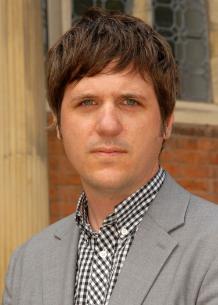Chris Renwick teaches Modern British History at the University of York; and in 2017 he achieved fame beyond the confines of the academic world with the publication of his book Bread For All, in which he put forward a new and challenging view of the origins of the British Welfare State. Having done his first degree at Leeds, he expressed great pleasure in returning to Hebden Bridge, and it was to an almost full Waterfront Hall that he presented a precis of his book’s argument.
He began by outlining what our ‘welfare state’ state comprises, and argued that we have come to have far too limited a view of its ‘cluster of institutions’, reducing it to the provision of state assistance to the poor: whereas it must be seen to also include pensions, the NHS, and state education. Just assisting the poor, in fact, he argued, was the system that the welfare state of the twentieth century replaced; and Chris gave some shocking evidence as to the brutality of the Poor Law and its prison-like institutions that existed across Britain from the 16th to the 19th centuries. It was on the back of the pioneering social research of institutions such as Rowntree that politicians in the decade before the First World War began to introduce initial provision of pensions and social insurance. Yet the real impulse to do something about the ‘state of the poor’ was not philanthropic, Chris Renwick argued, but came from the fact that such a high proportion of volunteers to fight in the Boer War were turned down on medical grounds. They were simply too feeble to fight for their country. We now think of eugenics as a tainted racist science, but in the first half of the last century it was a ‘respectable’ discipline, developed in an attempt to produce a healthier and stronger population in Britain. William Beveridge himself, Chris reminded his audience, had a long interest in eugenics.
Beveridge was also, politically, a Liberal; and at the core of Chris Renwick’s argument is a claim that our welfare state is a creation most importantly of liberalism, not socialism. The initial Beveridge Report of 1942 was all about establishing a universal scheme of national insurance. But this wasn’t to be paid for out of taxation, but from contributions by every worker. Beveridge was very close to Maynard Keynes, and Renwick said this influenced his view that a system of national insurance would only do its job if three other things were also in place. These were a national health service free at the point of use; a universal system of free and compulsory state education up to the age of sixteen; and full employment. Only this package could provide an adequate basis on which communities and individuals could work to fulfil their potential – and thus become useful citizens. Our welfare state was never meant to just be a safety net, Chris Renwick argued; it was also about providing a solid basis on which individuals could go on to create a better society.
An animated Q & A session followed Chris’s talk, in which he shared the concern that many in the audience showed for the future of our welfare state in a political climate that once again seems to victimise the weakest in society and gives little positive role to the state. It was a sobering conclusion to an enlightening evening when Chris said present debates over the poor in Britain remind him of those in the early nineteenth century.
